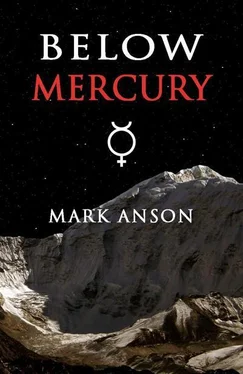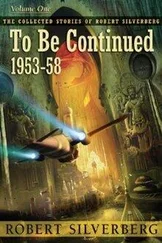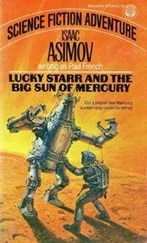‘Mach three point five. Skin temperature two hundred and climbing,’ Wilson’s voice informed them.
‘Ejection seats safed,’ Clare said, turning and locking the ejection control switch. The display panel changed to show six green LEDs. The seats could not be used from now on; anyone attempting to eject at hypersonic velocities would be smashed instantly to a pulp by the roasting, sledgehammer blow of the airstream.
As the spaceplane’s speed climbed higher still, cold fuel coursed through cooling channels in the nose, and the leading edges of the wing and fins, carrying away the intense heat of air friction. More cold fuel, passing through a dense mass of cooling pipes in the engine intakes, soaked up the scorching heat of the incoming air, followed by a deluge of liquid oxygen to cool the air further and boost thrust from the engines.
‘Mach six. Engines at maximum temperature.’
The autopilot raised the nose slightly, taking the spaceplane into thinner air, trading off ram air pressure, speed, propellant consumption, aerodynamic loads and engine temperature to optimise the spaceplane’s trajectory. It was a delicate balancing act; if the craft stayed too long in denser air, the engines would get too hot and melt, but if the craft climbed too fast, the air would be too thin to provide sufficient thrust.
It was a battle between two forces: the thrust of the ramjets, pushing the spaceplane forward, and the searing blast of the air, its very molecules torn apart by the hypersonic speed of the craft.
Through the slit-like windows of the visor, the colour of the sky, already a deep midnight blue, darkened towards black. They were passing into the highest reaches of the atmosphere. Occasional streaks of brilliant light zipped up and over the visor, as tiny flecks of heat resistant paint came off the spaceplane’s nose and flashed instantly to glowing vapour in the airstream.
‘Mach ten, reducing thrust,’ Wilson announced. The push in their backs dropped fractionally. The incoming air was so hot now that, even with precooling, the engines could not run at full power. The ramjet combustors and nozzles glowed red-hot as the craft tore upwards into the thinning air, guzzling liquid oxygen to maintain combustion. The roar of the engines altered, rising in pitch to a distant falsetto screech, as the air faded towards vacuum.
‘Mach eleven. Ramjet shutdown. Main engine ignition in five.’
The thrust and noise of the ramjets faded, and for a few seconds, the crew could breathe again. The spaceplane coasted upwards, rising out of the scorching hypersonic air. The glowing nozzles of the ramjets were cooling down, their job done, as the main rocket engines pressurised, ready for firing.
‘Ignition.’
For a moment, nothing seemed to happen, then the main valves to the four engines opened wide, and the whirling blades of the turbopumps forced 32 tonnes a minute of cryogenic propellants into the engines’ combustion chambers.
The crew were slammed back into their seats by the sudden onslaught of two million newtons of rocket thrust, and the spaceplane surged forward, accelerating into the fringes of the atmosphere on the edge of space. A deep-throated bass rumble came through the spaceplane’s structure, as the huge aerospike engines accelerated the spaceplane past Mach eleven, to Mach twelve, Mach thirteen and beyond; pushing it faster and faster as it climbed towards its orbital speed of nearly eight kilometres per second.
The navigation displays in front of Clare and Wilson changed, to show the spaceplane’s climb and acceleration against the curving magenta line of its planned orbital trajectory. The control surfaces had no effect, now that the craft was flying in vacuum, and the flight computer steered the spaceplane by tiny nudges to the engines, adjusting the angle of thrust to keep the craft in the correct attitude.
The spaceplane’s flight angle flattened out as it climbed, so that it was moving almost parallel to the ground far below, adding forward velocity to accelerate the craft into orbit.
The acceleration mounted as the propellant tanks emptied, rising through two gees, to three gees, and still it climbed. Matt could hardly raise his arm off the armrest of his seat, and it was an effort to breathe; his ribcage was being squeezed in by the mounting acceleration.
The noise of the engines was changing, sounding hollower as the huge tanks emptied. The last few tonnes of fuel and liquid oxygen quivered over the mouths of the feed lines.
The engines blasted on, the thrust unrelenting, forcing the rapidly lightening craft to dizzying speeds. The final few seconds of the climb carried the greatest acceleration of all, crushing them into their seats, turning the spaceplane from an earthbound object doomed to fall, into an orbiting spacecraft that would fall round the Earth and never land.
The navigation display showed the white path of their trajectory moving closer and closer to the magenta line, until the little arrowhead of the spaceplane grazed it, and the two lines became one.
The thunder of the engines stopped.
‘Main engine cutoff.’
Wilson’s voice sounded strange in the sudden quiet. A long, declining wail came faintly through the craft as the turbopumps ran down, followed by the brief roar of helium gas in the purge cycle.
The superb engines had done their job flawlessly, taking the spaceplane all the way from the runway on Guam, up to an altitude of 320 kilometres and an orbital speed of nearly eight kilometres per second. Clare locked the thrust levers in their cutoff position and disarmed the firing controls, and gave the console a short pat of appreciation.
The purging roar ceased, but nobody spoke; it felt as if they were falling forward, as indeed they were; falling round the curving surface of the world below. Matt gripped the arms of his seat, waiting for the feeling to pass, and hoped that the anti-nausea pills he had taken several hours previous would do their job.
Matt’s arm drifted up, and he realised he was weightless, floating in his seat, only held there by the pressure of his seat straps. As always, he grinned helplessly at the sensation; it truly had to be experienced. The vestibular disturbance was passing, and he looked around. Bergman was smiling as well, watching the ends of his seat straps float out in front of him.
Wilson inspected the navigation display, which had changed to show their orbital situation, and the location of the waiting tug, 200 kilometres above them in its higher orbit.
‘Confirm orbit established. We’re here to stay. Tug beacon locked on, MMS is ready for orbital transfer update. We’ll make rendezvous in – seventy-four minutes.’ He nodded in satisfaction; they were right on target with their orbit insertion.
‘Okay everyone, welcome to orbit. Hope you enjoyed the ride.’ Clare’s voice came over their headsets. ‘Very smooth climb up, no problems at all. We just need to run through some checks, and then we’ll start preparing for the rendezvous. You can take off your helmets now, but make sure you stow them properly – I don’t want any of them floating around while I’m docking.’
There was a brief hiss as Clare unsealed her faceplate and swung it upwards, then removed her helmet. The rest of them followed suit, and Matt sighed with relief as he struggled free of the confines of his helmet and stretched his aching neck muscles.
‘Right, let’s take a look at the view.’ Clare reached out to the centre console, and the protective visor, which had covered the windows throughout the orbital climb, unlocked and lowered slowly out of sight, opening up the view ahead.
The black sky of space expanded around them, and then the brilliant blue-and-white curve of the Earth flooded into the cockpit. The wide expanse of the Central American coastline straddled the centre windows, a mass of browns and greens against the blue of the Pacific.
Читать дальше











